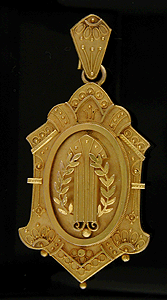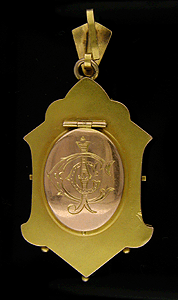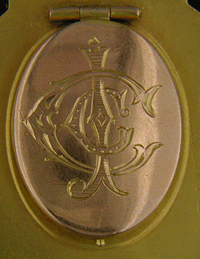
Victorian MonogramsBy A. Steel Penn |
[Editor's Note: Beautifully hand-engraved monograms were a passion among Victorians. Some were even known as "monogramaniacs." This article by A. Steel Penn (a pseudonym for an engraver if there ever was one) first appeared in Appleton's Journal of Popular Literature, Science, and Art in April of 1871.] The present mania for these engraved conundrums is only a revival. After a suspension of two centuries or so, the epidemic is having another run. These devices can be traced back to early ages - to the Greeks at least and possibly to Egyptian parentage. Derived from two Greek words signifying sole ("mono") and letter("gram"), they are defined as "characters, or ciphers, composed of two or more letters interwoven, being an abbreviation of a name." Some modern engravers dispute this and say that the true monogram should be so contrived that any two of its letters, if not all, should have some portion in common. Thus the diphthong "AE" is a true monogram, and as such it may be held as embracing the four initials "A E F L", in any desired order; albeit there is a theory that in these combinations the initial of the surname should be the most prominent letter. Without splitting hairs, however, over niceties of definition, it is true that many of our modern monograms are not "abbreviations of names," but merely intertwisted initials, or what dissenting engravers call a cipher, and, like the Dutchman with his riddle, one wants a "schlate und bencil" to decipher them. |
 |
 |
|
A Victorian locket with monogram. Circa 1880, 10kt gold. |
|
Monograms were used on the coins of the old Greek cities by the early Christians, by the Carlovingian sovereigns; the "merchants' marks" of the middle ages were often monograms, as were the devices on tradesmen's tokens, the signatures of old painters and printers, while they are by no means unknown to modern publishers. The subject furnishes its share of interest to the antiquarian, and a few years since there was published in London a little volume on "Monograms, Ancient and Modern; their History and Art-treatment with Examples," etc. As a means of handing down one's name to posterity, they can hardly be considered perfect successes. A monogram of an old painter, comprising a P, a C, an L, and a D, as far as I can make out, has puzzled the readers of Notes and Queries, and has been ascribed to Peter Quast, Lewis Crosse, Sir Peter Lely, and I know not how many others. |
|
Close-up of monogram, "CCI" |
|
At the present rate of display among our people, the monogramaniacs will soon run out of localities on which to manifest their love for letters. From seals and rings, jewelry and watches, cards and note-paper, plate and carriages, they have descended to table-linen, bath-towels, dog-cloths and shirt collars, until there seems to be no spot left on which to apply them, unless it be to tattoo them on the forehead or put them on the door-plate. In the latter case we venture to suggest that a small boy at hand with a libretto will be a needful accessory, for none but the individual to be guessed at could translate the hieroglyphic snarl which looks like the tangle of angleworms known as an eel-bob. Who can tell whether S. J. M. curlecued together stands for Susan Jane Muggins, Melville J. Snooks, Julia Melissa Spriggins, or Moses S. Jinks? Shakespeare asks "What's in a name?" With what a deal more reason he might ask, What's in a monogram? |
| |
||
| Antique Jewelry Galleries Antique Cufflink Gallery If you have any questions, suggestions or comments, I can be reached at .
Or, if you prefer snail mail, my postal address is: |
||
|
|
